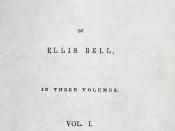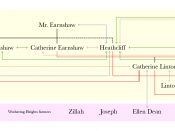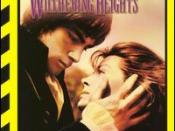Wind - The home of the Earnshaws and then Heathcliff is called 'Wuthering Heights,' and in the first chapter Mr. Lockwood says that 'wuthering' is a significant adjective, as it is "descriptive of the atmospheric tumult to which its station is exposed in stormy weather. Pure, bracing ventilation they must have up there at all times, indeed; one may guess the power of the north wind blowing over the edge, by the excessive slant of a few stunted firs at the end of the house; and by a range of gaunt thorns all stretching their limbs one way, as if craving alms of the sun" (6).
Indeed the wind is an important symbol for change in the novel. It is present during many of the significant events in the lives of the characters. When Mr. Earnshaw dies there is a 'high wind,' and the weather is described as 'wild and stormy.'
On the night that Heathcliff leaves Wuthering Heights there is a great storm with wind and rain. And on the morning that Ellen finds Heathcliff dead, the rain and wind are coming in through his window and beating his lattice back and forth.
Windows and Doors - Throughout the novel there are instances of locked or open windows and doors symbolizing imprisonment or freedom. In the very beginning Lockwood encounters locked doors and gates at Wuthering Heights, and he sees the ghost of Catherine trying to get in a window. Ellen leaves a window open for Heathcliff to come in and see Catherine in her coffin. Most of the examples come later in the novel when Heathcliff has Isabella and then Catherine locked up in Wuthering Heights. Catherine cannot leave the house or her room because of locked doors, and Ellen cannot leave either because...


